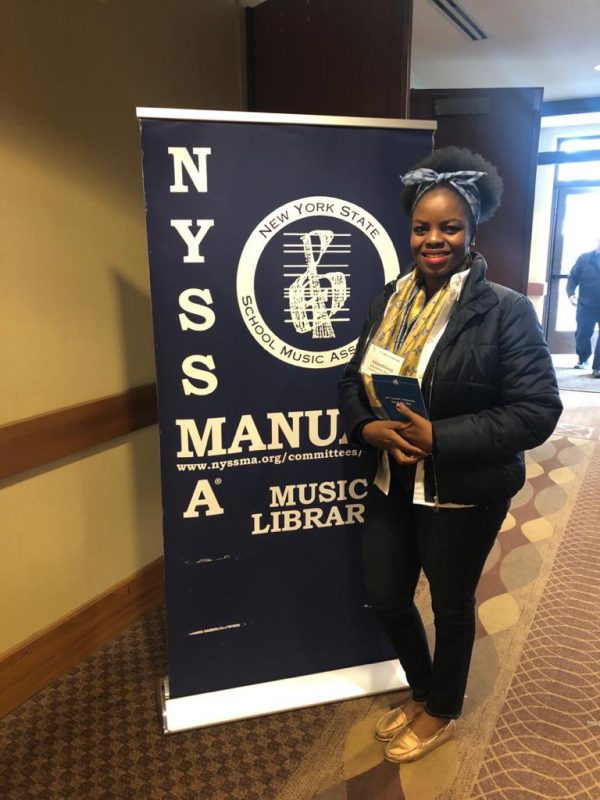 Passionate about the power of music in education, Akhutleleng “Akhu” Mogami wants to expand teaching of music to primary school students in her native Botswana.
Passionate about the power of music in education, Akhutleleng “Akhu” Mogami wants to expand teaching of music to primary school students in her native Botswana.
Mogami, an alto saxophonist in a jazz band and founder of a private music school in Botswana, is one of the 16 recipients of the Fulbright Distinguished Award in Teaching Program for International Teachers who spent the first half of the semester in the School of Education, before the COVID-19 pandemic required everyone to return home.
Mogami hopes to present her inquiry project, “Using Music in Schools to Enhance Academics,” to the Ministry of Basic Education in Botswana “to have primary school students take music lessons to help them cope with academics.”
Noting recent poor results on the annual national final examination in Botswana, she says she hopes studying music will improve results. “I believe so because there have been a lot of research that has been done about music and how it correlates to academia, and the results have been amazing to those who implemented the recommendations,” Mogami says.
While in Syracuse, she was placed in music classrooms at Ed Smith Elementary School, near Syracuse University.
“I observed that music is available to all the students and there are music classrooms that are well equipped. This is not the case in Botswana,” Mogami says. She’s impressed at the presence of assistants in the kindergarten and first-grade classes and that in inclusive classrooms “special needs students enjoy the music lessons, just like others.”
Mogami set out on a career path for teaching music, then added performance to her skill set. As a music student at the University of KwaZulu-Natal, she was not allowed to transfer into the jazz program. So, she bought a saxophone, got a book from a library and taught herself how to play.
She’s a founding member of the Metrophones, a 12-piece band formed in 2011 and well known in Botswana. The Metrophones—two saxophones, trumpet, trombone, two keyboards, two drums, bass guitar and three vocalists—specialize in Afro pop, blues, soul, house and Kwaito (a music genre that emerged in South Africa in the 1990s).
After several years teaching music in secondary schools, Mogami opened Kingdom Arts Academy in 2013. It’s a private music school that admits children from 6 years old (first grade) to adults. Most students attend on Saturday mornings, though some come after school on weekdays. She gives lessons on the recorder and saxophone and teaches music theory and history to the school’s full-time students.
Enrolling more students in a fee-based school is a challenge, reflecting the country’s lack of interest in music education, and, Mogami says, “Not a lot of parents believe in music education.”
She says she hopes for a pilot project in Botswana to test her plan for more music education.
“This would also be beneficial to students who are not academically gifted to also find something that they can enjoy doing and make careers out of,” she says.
Education in Botswana mirrors the British system, so the curriculum differs from the American educational system. At Ed Smith Elementary School, Mugami says, “The class sizes are way smaller and more manageable than in Botswana,” where classes can have as many as 50 students.
American teachers’ salaries are much higher, she continues, and “the schools are better equipped than in Botswana, hence the learning environment is more conducive and enabling.”
In addition to a weekly seminar with the Fulbright cohort, Mogami audited two SOE classes this spring: International Education for Transformation and Instructional Design and Development, and continued to participate online during the second half of the semester.
Mogami says she felt “pain and sadness” at the abrupt end to her Syracuse experience. She wanted more time to share the “beautiful story” of her country and get to hear stories from the other Fulbrighters about their countries.
“As an educator this is always very important, because I always want a chance to learn from someone, and someone to learn from me,” she says.
